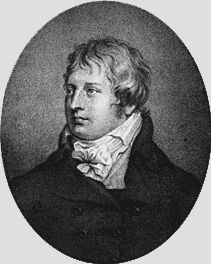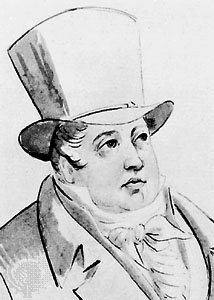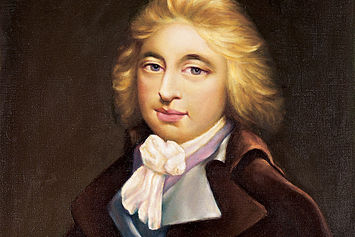<Back to Index>
- Chemist Pierre Louis Dulong, 1785
- Composer Jan Ladislav Dussek, 1760
- Vice Admiral François Paul Brueys d'Aigalliers, 1753
PAGE SPONSOR


Jan Ladislav Dussek (baptized Václav Jan Dusík, his surname was written also Duschek or Düssek; February 12, 1760 in Čáslav – March 20, 1812 in Saint-Germain-en-Laye) was a Czech composer and pianist. He was an important representative of Czech music abroad in the second half of 18th century and the beginning of 19th century. In some of his piano writing, Dussek anticipated features of musical Romanticism.
Dussek was one of the first piano virtuosos to travel widely throughout Europe. He performed at courts and concert venues from London to Saint Petersburg and Milan, and was celebrated for his technical prowess. During a nearly ten year stay in London, he was instrumental in extending the size of the pianoforte, and was the recipient of one of John Broadwood's first 6-foot (1.8-meter) pianos. Neither his playing style nor his compositions, however, had any notable lasting impact. While it has been suggested that Franz Liszt was a successor to Dussek in the realm of piano virtuosity, much, if not all, of Liszt's performance and composition was done without any specific knowledge of Dussek. While his music continued to be somewhat popular in 19th century Great Britain, it is now virtually unknown.
The
Dussek family has an extraordinarily long history as professional
musicians, starting at least as early as Jan Ladislav's grandfather Jan
Josef Dusík (b. 1712), and lasting in the Moravian branch
of the family at least into the 1970s. Jan Ladislav's mother, Veronika
Dusíková (née Štěbetová), played the harp, an instrument, along with the piano, for which her son went on to write much music for. His father, Jan Josef, was also a well known organist and composer. Jan Ladislav, the oldest of three children, was born in the Bohemian town of Čáslav, where his father taught and played the organ. His first musical instruction came from his father, who began teaching him piano at 5, and organ at age 9. His voice was also found to be good, so he also sang in the church choir. He studied music at the Jesuit gymnasium in Jihlava,
where he studied with Ladislav Špinar, its choir director; his grades
were reported to be poor. From 1774 to 1776 he studied at the Jesuit
gymnasium in Kutná Hora, where he also served as organist in the Santa Barbara Jesuit church. In
1776 he went to the New City Gymnasium in Prague, where he was again
reported to be a lazy student. In 1777 he enrolled in the University of
Prague, where he lasted one semester. After these early studies in Bohemia he entered the services of one Captain Männer, an Austrian military man, in 1778. Dussek traveled with the Captain to Belgium in 1779, where he became the organist at the St. Rumbold's cathedral in Mechelen. In Mechelen he gave his first public recital, playing his own compositions. He then travelled to the Dutch Republic, where a well received concert in Amsterdam brought him to the royalty's attention. He was invited to The Hague, where he gave lessons to the three children of Stadtholder William V. While at the Hague he gave a performance before Kaiser Joseph II of Austria, who acknowledged Dussek's prowess. By 1782, after leaving Männer's service, he was in Hamburg, where he gave a concert on the "new English fortepiano". While in Hamburg, he may have studied with C.P.E. Bach. He also published his first works, three piano concertos and 3 violin sonatas (C 2 – 7), all of which were assigned Opus 1.
From Hamburg he moved to St. Petersburg, where he was a favorite of Catherine the Great. While there he was introduced to a technician named Hessel, who had developed a keyboard version of the glass harmonica, an instrument Dussek went on to master. Dussek was forced to leave Russia quite abruptly, just ahead of Catherine's
secret police, amid suspicions of his involvement in a plot to
assassinate Catherine. In
a possibly apocryphal tale surrounding his departure, he was en route
to play for Catherine when he found a ring, which he put on. Catherine
recognized the ring as belonging to a known conspirator, raising her
suspicions about Dussek.
After Dussek left St. Petersburg, he took a position as music director for Prince Antoni Radziwiłł in Lithuania,
where he stayed about a year. His departure from Lithuania may have
been prompted by an affair he was rumored to have with the Prince's
wife, the Princess of Thurn and Taxis. He toured Germany for the next few years as a virtuoso performer on the piano and on the glass harmonica, eventually arriving in Paris in 1786. The German tour was a significant success for him. One review of a Berlin concert
said, "He obtained great distinction as a pianist, and was little less
admired for his playing on the [glass] harmonica ... some critics
pretend to trace to his skill upon this instrument many of his
specialities of style both as a pianist and composer". Another reviewer wrote, of a concert in Kassel, "He entranced all listeners with a slow, harmonic, and studiously modulated prelude and chorale." He may also have been in Ludwigslust in 1786, where he would have performed his Extract from an Easter Canata (C 26) for the Duke of Mecklenburg - Schwerin.
In Paris Dussek became a favorite of Marie Antoinette, who tried to dissuade him from going on a performing tour to Milan in 1788. However, she was unsuccessful, as Dussek wanted to visit his brother Franz in
Milan. Dussek's trip to Milan was quite successful; his performances
"produce[d] quite a sensation". He returned to Paris, where he stayed until shortly before the outbreak of the Revolution in 1789. During his time in Paris he may have met and played with a violinist by the name of Napoleon Bonaparte. He also published a series of violin sonatas (C 27 – 29) dedicated to Eugénie de Beaumarchais, daughter of writer Pierre Beaumarchais. Dussek left France for England in May or June 1789, where he settled in London. It is sometimes alleged that he took with him the harpist wife of the composer Jean-Baptiste Krumpholtz, who drowned himself into the Seine as a consequence; however, this is likely untrue, as Anne-Marie Krumpholtz went to London in 1788. It is also uncertain whether he left Paris because of
the looming crisis in France, or if it was merely coincidental. Early
biographers have generally claimed that he left because of the
impending revolution. He
is reported to have had a concert engagement in London in early June
1789; this would have required his departure from Paris before some of
the critical steps early in the Revolution. Dussek
made London his home until 1799. By 1790 he was well established as a
performer and teacher. He was in such demand that Davison, in an 1860
biographic sketch, noted that "he became one of the most fashionable
professors of the day, and his lessons were both sought with avidity
and remunerated at a rate of payment which knew no precedent except in
the instance of John Cramer." He had also established a relationship with piano maker John Broadwood, taking delivery of one of the very first 5.5-foot (1.67 meter) pianos. His
collaboration with Broadwood would continue to bear fruit when, in
1794, he also received the first 6-foot (1.8 meter) piano. In
the spring of 1791, Dussek appeared in a series of concerts, a number
of which featured Sophia, the young daughter of music publisher Domenico Corri. In a concert on June 15 that year, the pair played a piano duet together; they were married in September 1792. Sophia Corri was
a singer, pianist, and harpist who became known in her own right. They
had a daughter named Olivia, but the marriage was not happy, involving
liaisons by both parties. Some of the concerts in 1791 and 1792 featured both Dussek and Joseph Haydn;
the older Haydn wrote quite favorably of Dussek in a letter to the
latter's father following one of the 1792 concerts. The other
highlights of 1792 (above and beyond his marriage to Sophia) included
the beginning of a music publishing venture with Sophia's father
Domenico. This business, while successful at first, fared poorly in
later years, and the circumstances of its failure spurred Dussek to
leave London in 1799, leaving Corri in debtor's prison. Dussek's
business acumen apparently had little impact on his performing and
composing while in London. Every year, he performed in a series of
concerts, at least some of which also featured Sophia, and which
frequently featured new works. Some works were so successful they were
repeated at later concerts in the series. Of one work, a reviewer wrote
in 1798, "Dussek's Military Concerto was repeated. We think it very
deserving of encomium." The concerto (C 153), which the reviewer
reported has having been a repeat performance, was played again the following week. In
1796, Dussek and his wife began having serious marital troubles. In an
account of uncertain veracity, it was reported that Sophia, who had
fallen in love with another man, asked Dussek for money to repair her
harp. She then used the money to leave the house, removing her
belongings in her harp case, and claiming to have left for dinner with
a female friend. A suspicious Dussek went with his father-in-law to the
man's house, where Sophia locked herself in. She and Dussek argued, and
she cursed him, claiming to be pregnant by the other man. Dussek,
relenting, promised her freedom to do what she wanted; this led to a
reconciliation of sorts. It seems unlikely that Dussek ever saw Sophia
and his daughter Olivia after he left London in 1799; Sophia had to
wait until she knew Dussek had died before she could remarry, which she
did in 1812. Some
of Dussek's compositions included arrangements of operatic and
theatrical overtures for piano. He decided to try his hand at opera in
1798; the result was The Captive of Spilberg, with a libretto by Prince Hoare. The opera opened at Drury Lane on November 14, 1798, and the music was well received, with the European Magazine's critic writing, "the music, by Mr. Dussek, was such as to intitle him to rank with the first composers of the time." In
1799, the business venture with Corri, which had never been very
successful, ran into financial difficulties. Dussek and Corri managed
to convince the librettist Lorenzo Da Ponte to loan them money to cover their debts. The failure to repay this debt put Corri into Newgate Prison and
caused Dussek to flee. Da Ponte believed that Dussek fled to Paris; in
fact he returned to Hamburg. The affair ended up bankrupting both Corri
and Da Ponte. Dussek then toured Germany, where he became one of the first "glamour" pianists, preceding Franz Liszt. According to Louis Spohr, Dussek was the first to turn the piano sideways on the stage "so that the ladies could admire his handsome profile." Before long he took up a position with Prince Louis Ferdinand of Prussia,
who treated him more as a friend and colleague than as an employee.
Together, they sometimes enjoyed what were called "musical orgies."
When Prince Louis Ferdinand was killed in the Battle of Saalfeld, Dussek wrote the moving Sonata in F sharp minor, Elégie harmonique, Op. 61 (C 211).
In 1807, despite his earlier affiliation with Marie Antoinette, Dussek returned to Paris in the employ of Talleyrand, the powerful French foreign minister. He wrote a powerful sonata (Sonata in A flat major, Op. 64, C 221) called Le Retour à Paris (The Return to Paris). This imposing sonata also received the nickname Plus Ultra in heated response to a piano sonata by Joseph Woelfl, said to be the last word in pianistic difficulties, entitled Ne Plus Ultra. The remainder of his life he spent performing, teaching and composing in Prussia and
France. His personal beauty had faded and he became grossly fat, so
much so that he was eventually unable to reach the piano keyboard. He
also developed a fondness for strong drink which probably hastened his
death.
